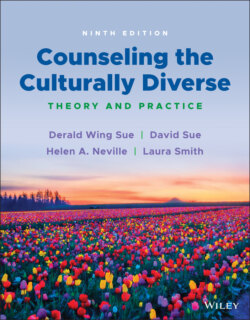Читать книгу Counseling the Culturally Diverse - Laura Smith L. - Страница 89
NATURE OF PEOPLE DIMENSION
ОглавлениеMiddle‐class European Americans generally perceive the nature of people as neutral. Environmental influences, such as conditioning, family upbringing, and socialization, are believed to be dominant forces in determining the nature of the person. People are neither good nor bad, but are influenced by their environment. Although several cultural groups may share features of this belief with White Americans, there may be qualitative differences that shape views of family structure and dynamics. For example, African American culture may also be characterized as affirming that people are basically neutral, and that environmental factors have a great influence on how people develop. This orientation is further specified, however, by the African American community's experience of racism, discrimination, and oppression as pervasive external factors that have harmful impacts upon individuals and families.
Asian Americans and American Indians tend to emphasize the inherent goodness of people. We have already discussed the Native American belief that people have an innate capacity to advance and grow and that problematic behaviors are the result of environmental influences that thwart the opportunity to develop according to one's nature. Likewise, Asian philosophies (Buddhism and Confucianism) affirm people's innate goodness and prescribe role relationships that manifest the “good way of life.” Central to Asian belief is the idea that the best healing source lies within the family (Daya, 2005; Walsh & Shapiro, 2006) and that seeking help from the outside (e.g., counseling and therapy) is non‐productive.
Latinx American traditions often view human nature as having the capacity for both good and bad. Concepts of dignidad and respeto undergird the belief that people are born imbued with positive qualities. At the same time, traditional elders may appeal to supernatural forces so that children may be blessed with a favorable human nature (Inclan, 1985). Thus, given that a child's nature may be accepted as destiny, parents may be less inclined to seek help from helping professionals or educators. The preferred mode of help may be religious consultations and talking with neighbors and friends who sympathize and understand the dilemma.
